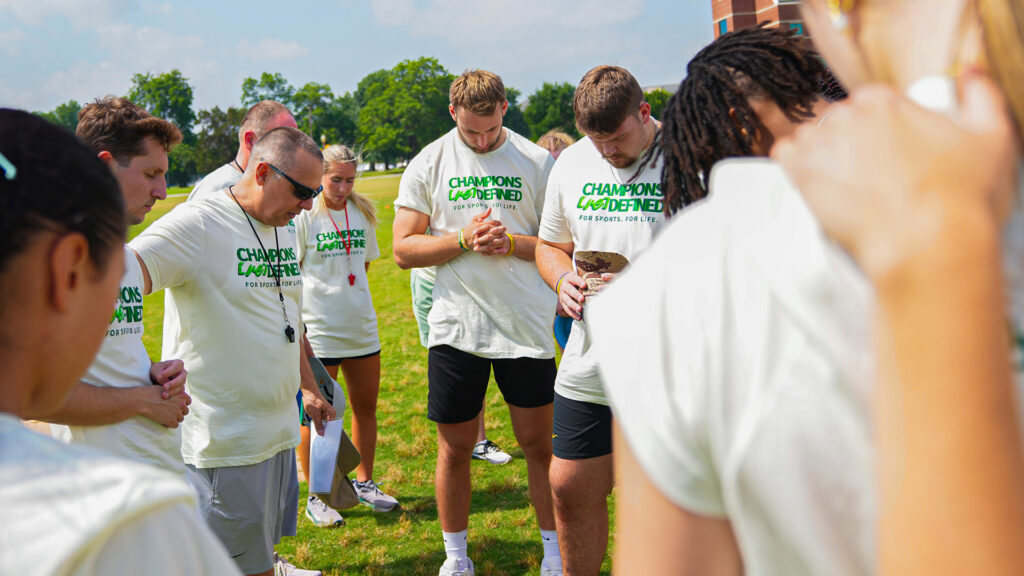“Fútbol is life.” It’s the signature phrase of Dani Rojas, the affable soccer star from the hit TV show Ted Lasso. Rojas’ love for soccer almost exudes from his pores, as he repeats this memorable line in nearly every episode in which he appears.
It is easy to chalk up Rojas’ zeal to youthful exuberance and naivety. The rest of us, however, have a more complicated relationship with sports. We tend to treat sports with zealous fanaticism, pious indifference, or something in between. If you have a religious background, you may have inherited a view that falls on the more conservative end of the spectrum. This restrained approach is rooted to some of the earliest human thought on the matter.
Take the ancient stoics, for example. These Greek and Roman philosophers found meaning in, among other things, temperance and prudence. Happiness was to be found in virtue and wisdom, and most other so-called good things in life should be treated with indifference. Sport, at least in the recreational sense, was thought to be largely irrelevant to a virtuous life.
Asceticism takes stoicism one step further. Ascetics adhere to strict self-denial, completely abstaining from all worldly pleasure, often for spiritual reasons. Life for an ascetic should be marked by austerity, restraint, and self-discipline. If you look closely, you will find tenets of asceticism woven through most world religions, including Christianity. When it comes to sports, participate if you must, but limit your emotional and physical investment, reserving your energy for more meaningful, eternally significant aims.

But what if sports and spirituality aren’t competing entities? What if there is spiritual significance to athletic competition? Imagine if faith not only informed our interaction with sports, but sports, in return, enlightened our faith.
The Faith and Sports Institute at Baylor University is seeking to understand this dynamic interplay between sports and faith. FSI brings together athletes, coaches, scholars, and ministers to examine moral and social issues as they relate to sports and spirituality. John White, a sports ethicist and the founder of FSI, explains that FSI provides “theological education, compelling research, and formative practices so that Christians can witness and revere what is good while also thinking critically about what is broken in sports.”
The institute offers a graduate degree program, online resources, and continuing education. Additionally, FSI directs high-school retreats for mentorship and training on what it means to be a discerning leader in sports, faith, and beyond. Furthermore, FSI is currently working with Baylor Athletics to develop a Christian approach to character formation in college athletics.
“If we do our work well,” says Paul Putz, who now directs the institute. “I think we’ll be training and developing thoughtful and faithful Christian leaders in sports and in the church. … We’ll be empowering students to engage with sports creatively and with a theological imagination that recognizes the beauty and the brokenness and the redemptive potential of athletic competition.”
Sports point toward the truth of human complexity.

They show us not just how well we compete, but how we compete. What happens on the field mirrors itself in the world, and how we show up on the field is likely how we show up in life. The athletic field is a literal proving ground to practice excellence, discipline, resilience, morality, and commitment. In both arenas, obstacles meet opportunity as we struggle and contend to reach a goal. We fall and fail. We struggle and persevere. There are fouls and penalties, touchdowns and grand slams. Hopes are dashed. And then renewed again.
Putz explains, “Sports are a place where the best of our selves is often revealed: creativity, cooperation, sacrifice, love, the pursuit of excellence. It is also a place where brokenness in individuals and in society is often revealed: cheating, insecurity, greed, pride, abuse, idolatry.”
“Christianity is so compelling to me,” he says, “because it provides a narrative that makes sense of this complexity — both the beauty and the brokenness we see in ourselves and our world. [It] offers us a hope that the brokenness we see is not the final answer, and that what is fractured will be made whole.”
In the end, the desire within sports reflects our innate longing for restoration. We are wired for wholeness. It is this hope of redemption — both in sport and in spirit — that propels us forward. The FSI continues the good and necessary work of exploring this connection, recognizing that with a better understanding of how we play, comes a better understanding of how we live.
In that sense, fútbol is, indeed, life.
C’est la vie.





